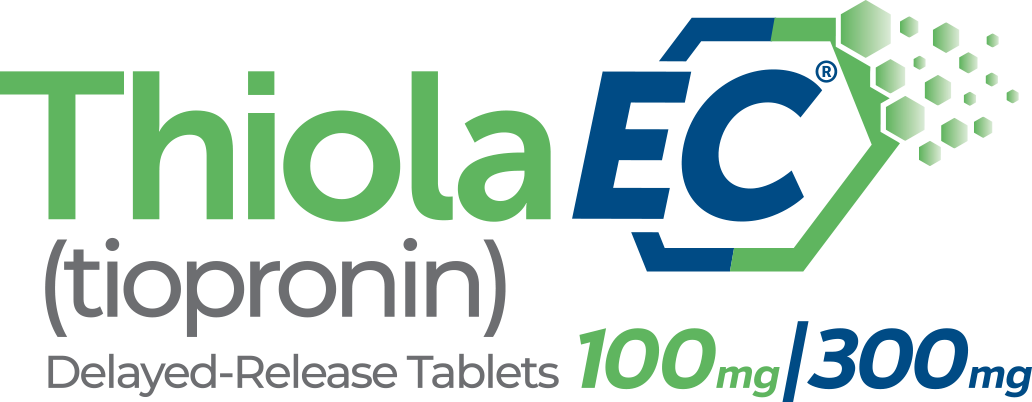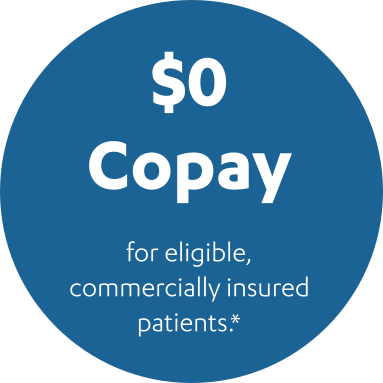THIOLA EC is formulated to help patient compliance
- Larger dosage strength—300 mg—may help reduce pill burden.1
- Available in 2 dosage strengths—100 mg and 300 mg.1
- Can be taken with or without food to give your patients more flexibility.1
- $0 copay for eligible, commercially insured patients.*
Download the Enrollment Form
*See full Copay Terms and Conditions.
Reference: 1. THIOLA EC [package insert]. San Antonio, TX: Mission Pharmacal Company.
THIOLA EC® (tiopronin, delayed-release tablets)
INDICATIONS AND USAGE: THIOLA EC® (tiopronin, delayed-release tablets) is indicated, in combination with high fluid intake, alkali, and diet modification, for the prevention of cystine stone formation in adults and pediatric patients ≥20 kg with severe homozygous cystinuria, who are not responsive to these measures alone.
Important Safety Information
CONTRAINDICATIONS: THIOLA EC is contraindicated in patients with hypersensitivity to tiopronin or any other components of THIOLA EC.
WARNINGS AND PRECAUTIONS:
- Proteinuria: Proteinuria, including nephrotic syndrome, and membranous nephropathy, has been reported with tiopronin use. Pediatric patients receiving >50 mg/kg of tiopronin per day may be at increased risk for proteinuria. Monitor patients for the development of proteinuria and discontinue therapy in patients who develop proteinuria.
- Hypersensitivity Reactions: Hypersensitivity reactions (drug fever, rash, fever, arthralgia and lymphadenopathy) have been reported.
ADVERSE REACTIONS: The most common adverse reactions (≥10%) are nausea, diarrhea or soft stools, oral ulcers, rash, fatigue, fever, arthralgia, proteinuria, and emesis.
DRUG INTERACTIONS: Avoid alcohol consumption 2 hours before and 3 hours after taking THIOLA EC as THIOLA EC is released faster in the presence of alcohol.
SPECIFIC POPULATIONS:
- Lactation: Breastfeeding is not recommended during treatment with THIOLA EC.
- Geriatric Use: Because elderly patients are more likely to have decreased renal function, care should be taken in dose selection, and it may be useful to monitor renal function.
You may report negative side effects to Travere Therapeutics Medical Information at 1-877-659-5518, or to the FDA at 1-800-FDA-1088 or www.fda.gov/medwatch.
Please see accompanying full Prescribing Information for additional Important Safety Information.
THIOLA® (tiopronin tablets)
INDICATIONS AND USAGE: THIOLA® (tiopronin tablets) is indicated, in combination with high fluid intake, alkali, and diet modification, for the prevention of cystine stone formation in adults and pediatric patients ≥20 kg with severe homozygous cystinuria, who are not responsive to these measures alone.
Important Safety Information
CONTRAINDICATIONS: THIOLA is contraindicated in patients with hypersensitivity to tiopronin or any other components of THIOLA.
WARNINGS AND PRECAUTIONS:
- Proteinuria: Proteinuria, including nephrotic syndrome, and membranous nephropathy, has been reported with tiopronin use. Pediatric patients receiving >50 mg/kg of tiopronin per day may be at increased risk for proteinuria. Monitor patients for the development of proteinuria and discontinue therapy in patients who develop proteinuria.
- Hypersensitivity Reactions: Hypersensitivity reactions (drug fever, rash, fever, arthralgia and lymphadenopathy) have been reported.
ADVERSE REACTIONS: The most common adverse reactions (≥10%) are nausea, diarrhea or soft stools, oral ulcers, rash, fatigue, fever, arthralgia, proteinuria, and emesis.
SPECIFIC POPULATIONS:
- Lactation: Breastfeeding is not recommended during treatment with THIOLA.
- Geriatric Use: Because elderly patients are more likely to have decreased renal function, care should be taken in dose selection, and it may be useful to monitor renal function.
You may report negative side effects to Travere Therapeutics Medical Information at 1-877-659-5518, or to the FDA at 1-800-FDA-1088 or www.fda.gov/medwatch.
Please see accompanying full Prescribing Information for additional Important Safety Information.

